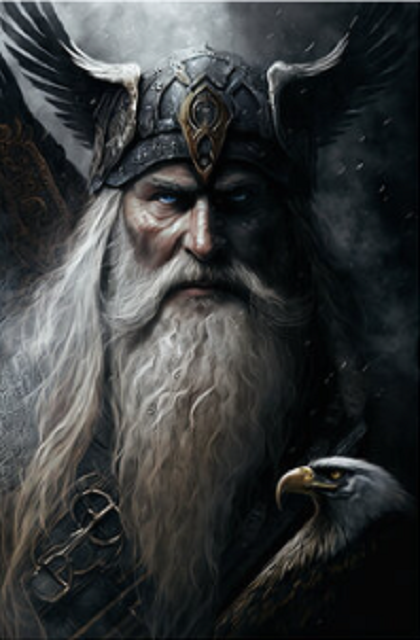Odin

Odin: The Allfather of Norse Mythology
Odin, often called the Allfather, stands as one of the most complex and revered figures in Norse mythology. He embodies a rich tapestry of attributes, encompassing wisdom, war, poetry, and death. As the chief of the Aesir gods, Odin's influence permeates through the sagas and eddas, providing a multifaceted view of his character and the culture that revered him.
Origins and Lineage
Odin's origins are rooted in the ancient traditions of the Germanic peoples. He is believed to be the son of the primordial giants Bor and Bestla, making him a central figure in the creation myths of Norse mythology. Alongside his brothers, Vili and Vé, Odin played a pivotal role in the creation of the world, slaying the primordial giant Ymir and using his body to form the earth, sea, and sky.
Attributes and Symbols
Odin is often depicted as an old man with a long beard, wearing a wide-brimmed hat and a cloak. His single eye, a result of sacrificing the other at Mimir's well in exchange for wisdom, symbolizes his relentless pursuit of knowledge. The two ravens perched on his shoulders, Huginn (thought) and Muninn (memory), fly across the world and bring back information, emphasizing his role as a god of wisdom and intellect.
Another prominent symbol associated with Odin is his spear, Gungnir, which never misses its target. He also rides Sleipnir, an eight-legged horse, further showcasing his extraordinary nature. Odin's hall, Valhalla, where he welcomes fallen warriors, reflects his connection to both war and the afterlife.
Roles and Domains
Odin's roles are as varied as they are significant. As a god of war, he is often invoked by warriors seeking victory in battle. However, his relationship with war is complex; he is also associated with the chaos and destruction that comes with it. Odin's influence extends to poetry and the runes, with myths depicting him sacrificing himself on the world tree, Yggdrasil, to gain the secret of the runes. This act highlights his connection to knowledge and the esoteric.
In the realm of the dead, Odin presides over Valhalla, where he gathers warriors who have died bravely in battle. These warriors are destined to fight alongside him during Ragnarök, the apocalyptic battle that will lead to the end of the current world and the rebirth of a new one.
Myths and Legends
Odin's mythology is rich with tales that reveal his cunning, wisdom, and occasional ruthlessness. One well-known myth involves his quest for the mead of poetry, a magical substance that grants the gift of poetry and scholarship. Through a combination of deception and transformation, Odin secures the mead, underscoring his role as a patron of poets.
Another significant tale is that of his self-sacrifice on Yggdrasil. Odin hangs himself from the world tree for nine days and nights, pierced by his spear, in a ritual of death and rebirth that grants him profound knowledge and the ability to understand the runes.
Worship and Legacy
Worship of Odin was widespread among the Germanic tribes, with evidence of his veneration found in various archaeological sites and ancient texts. He was particularly revered by the Viking warriors, who sought his favor in their quests for glory and conquest. The legacy of Odin extends beyond the ancient world, influencing modern literature, art, and popular culture. Characters inspired by Odin appear in works by J.R.R. Tolkien and in the Marvel Comics universe, where he is portrayed as a powerful deity and father figure.
In contemporary spirituality, Odin is also honored in various neo-pagan traditions, such as Heathenry and Ásatrú, where practitioners seek to revive and reinterpret the worship of the old gods.
Odin's Conclusion
Odin's enduring legacy as the Allfather in Norse mythology is a testament to his multifaceted nature and the profound impact he has had on culture and spirituality. As a god of wisdom, war, poetry, and death, Odin continues to captivate the imagination, symbolizing the quest for knowledge, the complexities of life and death, and the indomitable spirit of the warrior.
